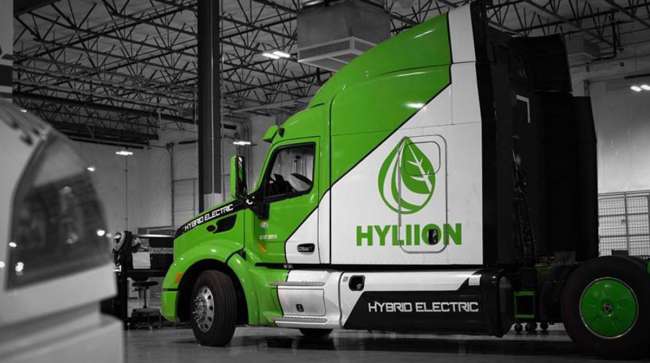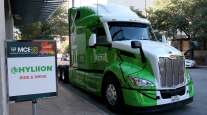Senior Reporter
Hyliion Makes Gains With Hybrid Electrification

[Stay on top of transportation news: Get TTNews in your inbox.]
Hyliion CEO and founder Thomas Healy said the company anticipates receiving more investment funds soon. It built an 80,000-square-foot plant, and trucks with its e-axle have accumulated more than 1 million miles of real-world travel as fleets begin to see hybrid-electric powertrains as a timely choice for improved fuel efficiency. And yet, he sometimes feels as if he is on the industry sidelines.
Fully battery-electric and hydrogen fuel cell vehicles, often prototypes, get the colossal buzz from media and at truck shows, he said, even though both lack deployed infrastructure.
Healy said a fleet executive recently told him he wished “the industry would just calm down and be more realistic about what the right solutions are for different applications.”
Healy spoke with Transport Topics on Nov. 7.

Healy
As an add-on system, the Hyliion 6X4HE has a net-weight addition of only 800 pounds and presents no new range restrictions from a standard diesel. In practice, the 6X4HE is able to extend the range of a traditional truck because the system keeps the engine in its optimal operating range, all while burning less fuel, according to the Austin, Texas-based company.
The system also can serve as an auxiliary power unit without running the engine, an additional fuel savings. A comprehensive aerodynamics package is included, too.
“We have taken the approach of bringing everything under one roof. It is very rare to find the vehicle integrator also doing the battery management technology, building battery modules and doing the install in-house as well,” Healy said.
Potential additional investors are taking note, he said.

In our first episode of RoadSigns, Season 5, we ask: How Will Machine Learning Enhance Transportation Software? Machine learning promises to supply your shippers with better freight visibility with one click, better manage your driver profiles and increase retention with easy software. But, Seth Clevenger wonders, will these technologies really continue to provide trucking and logistics managers with better decision and support solutions for real-world problems tomorrow? At the 2019 McLeod Software User Conference, our host discusses all this with company CEO Tom McLeod. Hear a snippet, above, and get the full program by going to RoadSigns.TTNews.com.
The company expects to announce “a really sizable amount of capital” coming in by the end of the first quarter or beginning of the second, Healy said.
“As we look at next year, I think there will be opportunities to share more. We are working on some new advanced technology — full powertrain of the vehicle,” he said.
Hyliion was founded in 2015. Five years ago there weren’t nearly as many willing investors, he said. “They were more looking for software-as-a-service, SaaS, models for the trucking industry.”
In March, Dana Inc. became the largest investor in Hyliion, and its key supplier.
More capital allows more testing and validation to be done, Healy said.
“It has been amazing for me coming into this industry from the outside. The conditions these vehicles go through are insane,” he said. “It’s harsh conditions going down roads. We definitely underestimated the amount of testing and validation these systems have to go through.
“We now have had to go buy machines that cost millions of dollars to do battery testing, and shock and vibe testing. In order to do it all the right way, it is extremely capital-intensive. They use the trucks in ways we could never have imagined.”
An example would be a Northeast fleet that washes its trucks every day during the winter.
“They put them through a wash bay. We have water-tight gaskets on the battery boxes, but what we didn’t account for is every day that gasket getting hit with a pressure washer. That eventually degrades that gasket, and then your box fills with water,” he said.
Ultimately, he sees a subscription-based service for the fleets on certain components.
“Just throwing ideas out there. Eventually, it could become that fleets don’t own the batteries; they just lease them on a monthly basis,” he said. “Then fleets wouldn’t have to worry about batteries degrading or getting to end of life because they don’t own them, they just rent them.”
Want more news? Listen to today's daily briefing:




